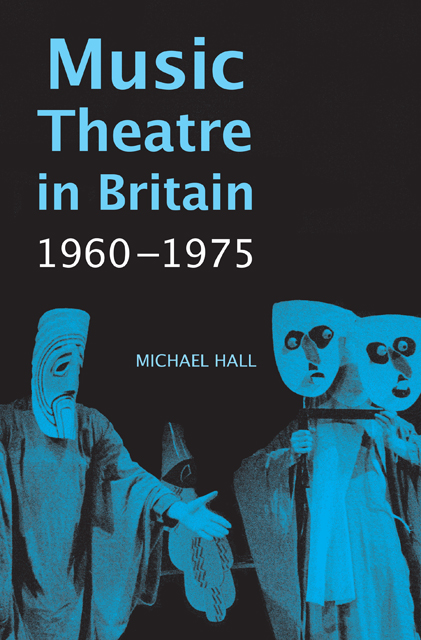8 - Experiment and Protest
Published online by Cambridge University Press: 23 February 2023
Summary
When discussing Focus Opera in Chapter Four, I mentioned that it was not until March 1968 that it began to mount Music Theatre instead of small-scale operas. Thereafter, until its demise in 1975, its policy was to produce Music Theatre mainly by young composers, foreign as well as British. Nevertheless, during those seven years only two of the works were specially composed for it. These were Cornelius Cardew’s Schooltime Compositions (which they presented in the International Students’ House on 11 and 12 March 1968 with Ligeti’s Aventures et Nouvelles aventures and Kagel’s Sur scène), and Nicola LeFanu’s Anti-World (presented with Birtwistle’s Down by the Greenwood Side and another performance of Sur scène) performed in the Cockpit Theatre on 29 and 20 June and 1 July 1972.
By initiating its new policy with such controversial works, Focus Opera made a bold statement about its intentions, for as we have seen, both the Ligeti and Kagel pieces were avant-garde in the extreme, and the specially commissioned work by Cardew was by a composer who seven years earlier had embraced the experimental ideas of John Cage and in so doing had rejected a European tradition that had continued since the Renaissance.
Cornelius Cardew (1936–81), the son of artistic parents (his father was a potter and his mother a painter), studied piano, cello and composition at the Royal Academy of Music in London between 1953 and 1957. He worked in Cologne as an assistant to Stockhausen from 1958 to 1960. His interest in Cage stemmed from concerts he heard in Cologne in 1958 and he played a key role in bringing the works of American avant-garde composers to the attention of British audiences.
Cardew’s most experimental compositions included Treatise (1963–7), a graphic score with scope for considerable freedom of interpretation, and The Great Learning, based on translations of Confucius by Ezra Pound. This work led to his forming the experimental Scratch Orchestra with Howard Skempton and Michael Parsons. In 1966, Cardew joined the recently formed jazz improvisation group AMM as cellist and pianist. The Scratch Orchestra came to an end in 1972 and Cardew became more involved in left-wing politics and finding means of using music in support of political causes.
- Type
- Chapter
- Information
- Music Theatre in Britain, 1960–1975 , pp. 168 - 198Publisher: Boydell & BrewerPrint publication year: 2015



